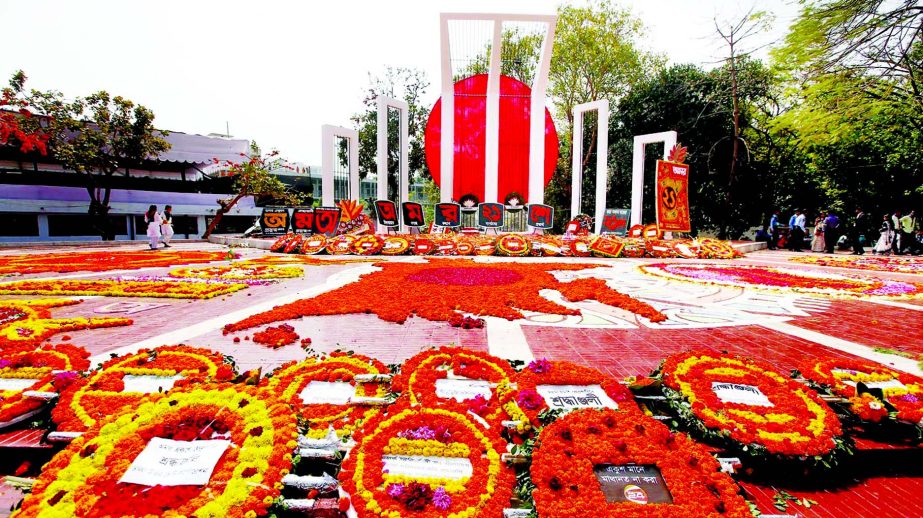
Weekend Plus Desk :
February 21 is the International Mother Language Day. Proclaimed by the General Conference of the United Nations Educational, Scientific and Cultural Organisation (UNESCO) in November 1999, the day has been observed every year since February 2000 to promote linguistic and cultural diversity and multilingualism.
The date commemorates a rare battle fought in the world history for one’s mother tongue. In 1952, students demonstrating for recognition of Bangla as one of the two national languages of the then Pakistan were gunned down by police in Dhaka, the capital of what is now Bangladesh, on this day. Salaam, Barkat, Rafique and Jabbar – the names got etched in the psyche of people for the times to come. Bangladesh and the Indian state of Bengal have for the last 65 years celebrated their mother tongue on this day, calling it Bhasha Divas. This is the language that has given the two countries their respective national anthems.
In 2007, the UN General Assembly had in a resolution called upon Member States “to promote the preservation and protection of all languages used by peoples of the world”, says the UN website. The very next year was proclaimed as the International Year of Languages “to promote unity in diversity and international understanding, through multilingualism and multiculturalism.”
The UN theme for 2017 is ‘Towards Sustainable Futures through Multilingual Education.’
UNESCO Director-General Irina Bokova has in her message on the day said education and information in the mother language is “absolutely essential to improving learning and developing confidence and self-esteem, which are among the most powerful engines of development.”
“There can be no authentic dialogue or effective international cooperation without respect for linguistic diversity, which opens up true understanding of every culture. Access to the diversity of languages can awaken the curiosity and mutual understanding of peoples. That is why learning languages is at one and the same time a promise of peace, of innovation and of creativity,” she says.
Bokova says the International Mother Language Day, devoted this year to multilingual education, is also an opportunity to mobilise for the sustainable development goals to ensure inclusive and quality education for all.
“On the occasion of this Day, I launch an appeal for the potential of multilingual education to be acknowledged everywhere, in education and administrative systems, in cultural expressions and the media, cyberspace and trade. The better we understand how to value languages, the more tools we will have to build a future of dignity for all,” she says in the message that has been posted on the UN website.
UNESCO is celebrating the International Mother Language Day with a daylong event at its headquarters in Paris. The event will be addressed by Bokova and M Shahidul Islam, Ambassador of Bangladesh to France and Permanent Delegate to UNESCO, among others.
February 21 is the International Mother Language Day. Proclaimed by the General Conference of the United Nations Educational, Scientific and Cultural Organisation (UNESCO) in November 1999, the day has been observed every year since February 2000 to promote linguistic and cultural diversity and multilingualism.
The date commemorates a rare battle fought in the world history for one’s mother tongue. In 1952, students demonstrating for recognition of Bangla as one of the two national languages of the then Pakistan were gunned down by police in Dhaka, the capital of what is now Bangladesh, on this day. Salaam, Barkat, Rafique and Jabbar – the names got etched in the psyche of people for the times to come. Bangladesh and the Indian state of Bengal have for the last 65 years celebrated their mother tongue on this day, calling it Bhasha Divas. This is the language that has given the two countries their respective national anthems.
In 2007, the UN General Assembly had in a resolution called upon Member States “to promote the preservation and protection of all languages used by peoples of the world”, says the UN website. The very next year was proclaimed as the International Year of Languages “to promote unity in diversity and international understanding, through multilingualism and multiculturalism.”
The UN theme for 2017 is ‘Towards Sustainable Futures through Multilingual Education.’
UNESCO Director-General Irina Bokova has in her message on the day said education and information in the mother language is “absolutely essential to improving learning and developing confidence and self-esteem, which are among the most powerful engines of development.”
“There can be no authentic dialogue or effective international cooperation without respect for linguistic diversity, which opens up true understanding of every culture. Access to the diversity of languages can awaken the curiosity and mutual understanding of peoples. That is why learning languages is at one and the same time a promise of peace, of innovation and of creativity,” she says.
Bokova says the International Mother Language Day, devoted this year to multilingual education, is also an opportunity to mobilise for the sustainable development goals to ensure inclusive and quality education for all.
“On the occasion of this Day, I launch an appeal for the potential of multilingual education to be acknowledged everywhere, in education and administrative systems, in cultural expressions and the media, cyberspace and trade. The better we understand how to value languages, the more tools we will have to build a future of dignity for all,” she says in the message that has been posted on the UN website.
UNESCO is celebrating the International Mother Language Day with a daylong event at its headquarters in Paris. The event will be addressed by Bokova and M Shahidul Islam, Ambassador of Bangladesh to France and Permanent Delegate to UNESCO, among others.

